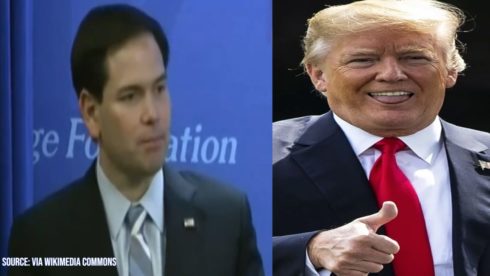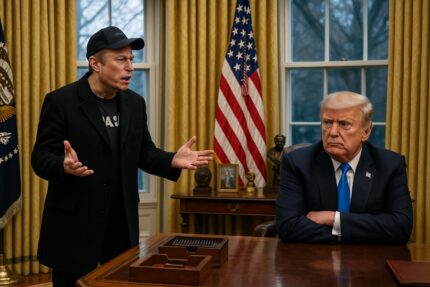President -elect Donald Trump has announced that Florida Senator Marco Rubio will serve as his Secretary of State if Donald Trump returns to the White House. This appointment, Donald Trump suggests, will reinforce a conservative approach to foreign policy, emphasizing America’s interests abroad. Marco Rubio, known for his strong views on China, Latin America, and the Middle East, is expected to shape a foreign policy aligned with the Heritage Foundation’s Project 2025, a conservative policy framework designed for the next Republican administration.
Donald Trump’s selection of Rubio marks a shift towards a more assertive U.S. stance internationally, reflecting priorities laid out in Project 2025. This policy agenda advocates for strengthening America’s global standing, prioritizing security, and asserting a firm stance on national sovereignty. Donald Trump and Rubio’s collaboration underscores a potential administration determined to reshape foreign alliances and challenge adversarial nations.
Marco Rubio’s Role and Background: Prepared for Strategic Diplomacy
Marco Rubio, who has served as a U.S. Senator since 2011, has long been an advocate for conservative foreign policy values. His experience on the Senate Foreign Relations Committee and his reputation as a staunch critic of authoritarian regimes provide insight into the approach he is likely to bring to the State Department. Marco Rubio’s stance on China, Russia, and Iran aligns with the Project 2025’s priorities, advocating for stronger policies on trade, defense, and national security.
Marco Rubio’s selection as Secretary of State indicates a commitment to reassert U.S. leadership in international affairs while opposing globalist tendencies. His approach is expected to focus on protecting American interests and strengthening ties with allies who share U.S. values. Analysts predict Marco Rubio will lead a foreign policy agenda that is both assertive and strategically cautious.
The Heritage Foundation’s Project 2025: A Blueprint for Conservative Governance
The Heritage Foundation’s Project 2025 outlines a conservative agenda focused on reshaping government policy across multiple sectors, including foreign relations. The plan emphasizes sovereignty, a robust national defense, and a streamlined government structure to increase efficiency. Project 2025 also aims to reestablish principles of limited government and return power to states and individuals while promoting American values globally.
Project 2025’s foreign policy recommendations advocate for stronger border security, reforming immigration policies, and challenging adversaries like China. Rubio’s appointment is seen as a step towards implementing these principles, with a focus on protecting American interests and economic stability in an increasingly polarized world.
Marco Rubio’s Statements on Project 2025 and U.S. Policy Direction
In a recent interview, Marco Rubio expressed support for Project 2025, emphasizing its alignment with his conservative views. He highlighted the need for policies that protect U.S. economic interests and security, stressing that the Heritage Foundation’s blueprint offers clear steps to address these areas. Marco Rubio believes that by following Project 2025’s guidance, a Trump administration could better address current challenges and safeguard America’s future.
Marco Rubio’s comments suggest that a new Donald Trump administration would not only adopt Project 2025’s policies but also prioritize a strong, sovereignty-focused approach. Critics, however, argue that the plan’s isolationist elements could strain relations with traditional allies and limit diplomatic engagement on issues like climate change.
Public Reaction: Divided Opinions on Rubio’s Appointment and Project 2025
Public response to Donald Trump’s announcement and Marco Rubio’s endorsement of Project 2025 has been sharply divided. Supporters applaud the decision, viewing it as a return to a conservative, American-first approach in foreign policy. They argue that Rubio’s appointment signals a commitment to security, economic growth, and national sovereignty. Proponents also believe Marco Rubio’s experience will allow him to bring stability and assertiveness to the State Department.
Opponents, however, express concern that Project 2025’s policies could isolate the U.S. on the global stage. Critics warn that these policies may lead to strained relations with allies and increase geopolitical tensions. Marco Rubio’s critics also argue that the Heritage Foundation’s agenda might prioritize conservative ideologies over pragmatic solutions.
Future Implications: A Conservative Shift in U.S. Foreign Affairs
If Marco Rubio’s appointment as Secretary of State proceeds, it may usher in a significant shift in U.S. foreign relations, aligning closely with the goals of Project 2025. Under Donald Trump and Marco Rubio, America’s foreign policy could pivot towards a more conservative, sovereignty-focused stance, with heightened emphasis on defense and reduced international commitments. This approach would aim to bolster national security and economic independence but may challenge established international norms.
The long-term impact of this shift could redefine America’s global role, emphasizing strategic self-interest over multilateral cooperation. As the U.S. potentially repositions itself on the world stage, allies and adversaries alike are closely watching how this new policy direction will unfold, setting the stage for potential geopolitical realignments.














